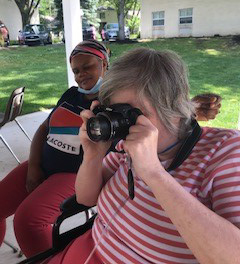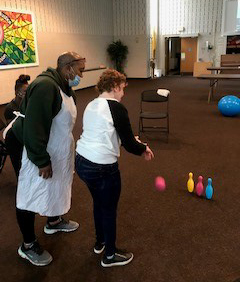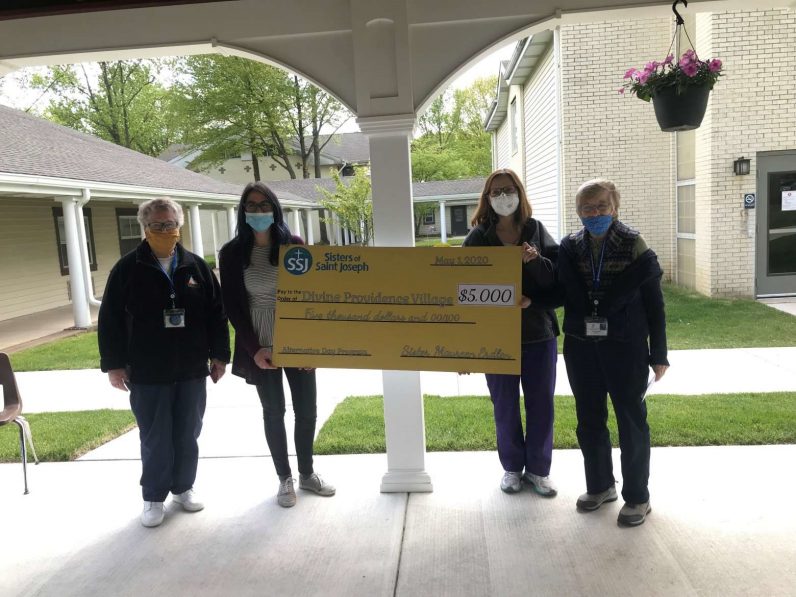
A resident of Divine Providence Village (DPV) practices her photography skills as part of an alternative day program for intellectually disabled adults. The initiative recently received a $5000 donation from the Sisters of St. Joseph, several of whom volunteer at the facility, part of archdiocesan Catholic Social Services. (Jean Calvarese-Donovan)
Intellectually disabled adults at an archdiocesan day program are discovering their artistic and athletic talents, thanks to a $5,000 grant from the Sisters of St. Joseph.
Last month, the religious order presented a check to administrators at Divine Providence Village (DPV) in Springfield, Delaware County.
The funds will enable DPV to purchase art supplies, physical fitness items and sensory materials for residents of its campus, which is part of the larger Communities of Don Guanella and Divine Providence (DGDP)
Administered by archdiocesan Catholic Social Services (CSS), DPV is licensed by Pennsylvania’s Department of Human Services as an intermediate care facility (ICF) for individuals with intellectual disabilities.
The DGDP communities provide a continuum of support through community and campus-based living arrangements, life sharing through family living, in-home assistance, respite care and day programs.
Typically, DPV residents have attended off-site day programs that provide opportunities for socialization and enrichment. But in recent years, “the needs of … residents have dramatically shifted,” said DPV administrator Jean Calvarese-Donovan.
“We now have individuals with dementia, behavioral challenges and fragile medical conditions,” she said. “Because of the complexities of their various conditions, these residents are no longer able to leave the campus to attend an outside day program.”
[hotblock]
In response, DPV created an in-house program, led by a master’s-level art therapist, to develop residents’ well-being through creative expression.
The initiative has been a success, said Calvarese-Donovan, one that “has been able to engage even the most challenging of individuals.”
The day begins with a morning meeting at which the weather is a top agenda item, since discussing current conditions helps orient participants suffering from advancing age and cognitive decline.
The meeting “also offers a positive thought of the day” and focuses on “identifying and practicing coping skills,” said Calvarese-Donovan.
Structure, consistency and predictability are essential to allaying anxiety and giving participants a sense of accomplishment, she added.
Even when residents are unable to create conventional art, she said, the materials are used to enhance their senses, perceptions, motor skills and reflexes — a great benefit for participants who often suffer from seizure disorders, cerebral palsy, depression and neurogenerative diseases.
Citing several studies, Calvarese-Donovan also noted that art therapy lessens social isolation by expanding participants’ communication and interpersonal skills.
Under program director Marie Julmice, art therapist Michelle McCaffrey monitors both individual and group progress. Sister of St. Joseph Susan Lindinger coordinates volunteers, among them fellow Sister Carol Beevers.

A resident of Divine Providence Village enjoys a game of bowling as part of an alternative day program that accommodates residents on-site at the archdiocesan Catholic Social Services facility. (Jean Calvarese-Donovan)
COVID-19 restrictions have “definitely prompted (DPV staff) to be even more creative,” said Calverese-Donovan.
Since March, off-site day programs have been closed, and DPV staff have had to provide activities for all residents, who are already grouped by building to minimize health risks.
Art supplies are not shared, and surfaces are disinfected after use. Staff wear personal protective equipment such as face masks and gloves, and social distancing is rigorously observed, with exercise and art activities taking place “as much as possible outside,” said Calvarese-Donovan.
Both the program and the grant “couldn’t have come at a better time,” she added, thankful that DPV staff had already launched the effort prior to the pandemic.
“With something already in place, we only had to expand the number of people participating, rather than start from scratch,” she said.
Although many participants are non-verbal or minimally so, they have let staff know “they are excited to be part of this program,” said Sister Susan, since “they are laughing and smiling.”
DPV resident Mary M. said she was “learning coping skills” as a result of the activities, while a DPV direct service professional said that residents “are excited when they get up in the morning.”
That’s exactly the response the program seeks to generate, said Calvarese-Donovan.
“Without this option, these individuals would remain in their homes for the entire day and evening, with the occasional community outing,” she said. “Participants now have the opportunity to attend a program conveniently located on campus, be among their peers … improve their skills, and feel successful.”

The Sisters of St. Joseph recently awarded $5000 to archdiocesan Catholic Social Services’s alternative day program at Divine Providence Village, which serves intellectually disabled adults. Pcitured from left to right are Sister Mary Veasey, SSJ; Michelle McCaffrey, Divine Providence Village; Jean Calvarese-Donovan, administrator of Divine Providence Village; Sister Susan Lindinger, SSJ. (Archdiocese of Philadelphia)
PREVIOUS: Archdiocese pays $50 million, so far, to abuse survivors
NEXT: Liturgical artist uses gifts to heal wounds of racism


Share this story